Introduction
In the rapidly evolving landscape of business technology, the demand for custom software solutions is surging as organizations seek to tailor their tools to specific operational needs. Unlike generic off-the-shelf software, custom applications are meticulously designed to integrate seamlessly with existing workflows, enhancing efficiency and driving competitive advantage.
With a proven track record spanning over two decades and across more than 20 countries, the shift towards bespoke solutions is not merely a trend; it is a strategic imperative for companies aiming to thrive in a dynamic marketplace. As industries recognize the significant benefits of customization—from improved retention rates to optimized processes—the importance of understanding the nuances of custom software development becomes paramount.
This article delves into the multifaceted world of custom software, exploring its advantages, the development process, and the critical factors businesses must consider when deciding between tailored solutions and off-the-shelf options.
Defining Custom Business Software Solutions
Tailored enterprise applications are carefully developed tools intended to meet the unique requirements and obstacles of distinct organizations. Unlike off-the-shelf solutions, which typically encompass broad functionalities that may not fully cater to unique operational demands, custom business software solutions are specifically engineered to align seamlessly with a company's workflows and objectives. This tailored approach utilizing custom business software solutions significantly enhances operational efficiency, streamlines processes, and empowers organizations to maintain a competitive advantage in their respective markets.
With more than 20 years of experience operating in over 20 countries, we have a demonstrated history of assisting companies in improving retention rates, elevating Average Order Value (AOV), and increasing Lifetime Value (LTV), highlighting the rising demand for tailored approaches. Significantly, approximately 36% of organizations worldwide are already utilizing process management tools for workflow automation, demonstrating this trend. The range of tailored applications is extensive, spanning from advanced customer relationship management (CRM) systems to thorough enterprise resource planning (ERP) tools, each intended to integrate seamlessly into the current organizational framework.
As Sri Narayan Shukla, Founder & CEO of Singsys, states, 'As the custom business software solutions market continues to surge, we are at a pivotal moment in technological innovation.' This growth highlights the significance of custom business software solutions in fostering success in enterprises. Moreover, with expenditure on Generative AI in application development anticipated to increase from $41 billion in 2023 to $287.4 billion by 2033, the focus on custom business software solutions becomes progressively crucial for companies seeking to succeed in a dynamic marketplace. Additionally, we focus on building community value by creating products that resonate with your audience and align with your internal goals.
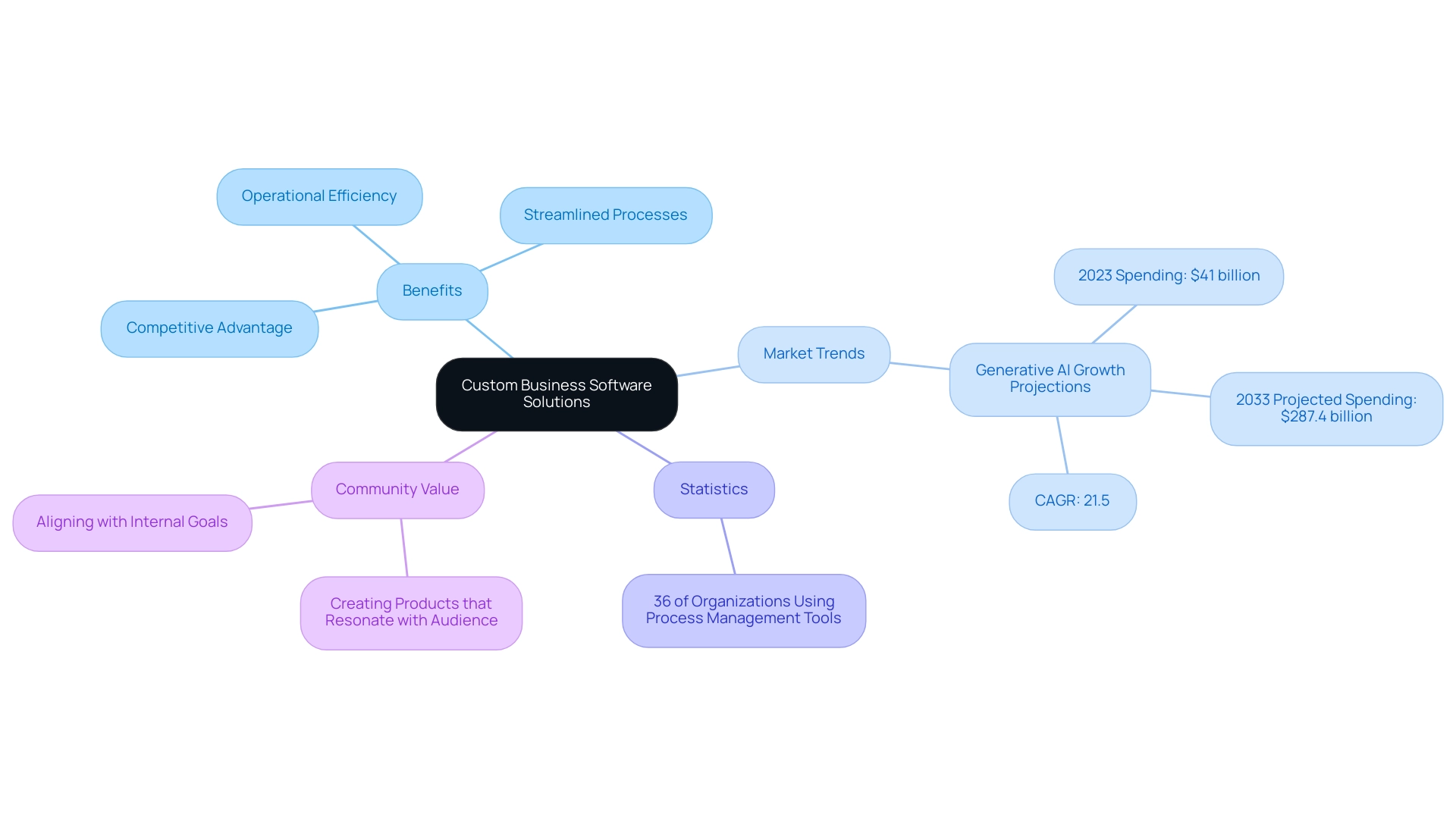
Key Benefits of Custom Software Solutions for Businesses
Custom business software solutions are progressively acknowledged for their numerous benefits, especially in improving flexibility, scalability, and smooth integration with current systems. As businesses evolve and market conditions fluctuate, the ability to adapt custom business software solutions accordingly is paramount, ensuring that these tools remain relevant and effective. With over 20 years of experience in providing customized e-commerce services, we have a proven track record of significantly enhancing critical KPIs for our clients, such as retention rates and Average Order Value (AOV).
Our offerings are designed not only to enhance operational efficiency but also to drive incremental revenue by optimizing user engagement and encouraging repeat purchases. Currently, 36% of organizations utilize custom business software solutions for workflow automation, indicating a significant trend toward personalized options. Brian Moore, VP of NICCA USA, Inc., stresses the significance of these options, stating,
The quality of research they have conducted for us has been excellent.
Furthermore, with the on-premise segment expected to grow at a CAGR of 21.0%, companies that implement custom business software solutions for tailored inventory management frequently experience significant reductions in waste and improved stock accuracy, leading to enhanced customer satisfaction and increased sales. For example, our customized offerings have assisted clients in creating loyalty programs that directly align with community needs, fostering a sense of belonging and driving sales. The considerable advancement anticipated in AI application development further emphasizes the innovation potential within custom business software solutions.
Given that the enterprise application market is anticipated to rise to $344.4 billion by 2027, companies investing in custom business software solutions are positioning themselves for swift growth and innovation, ultimately gaining a competitive advantage in a constantly changing environment.
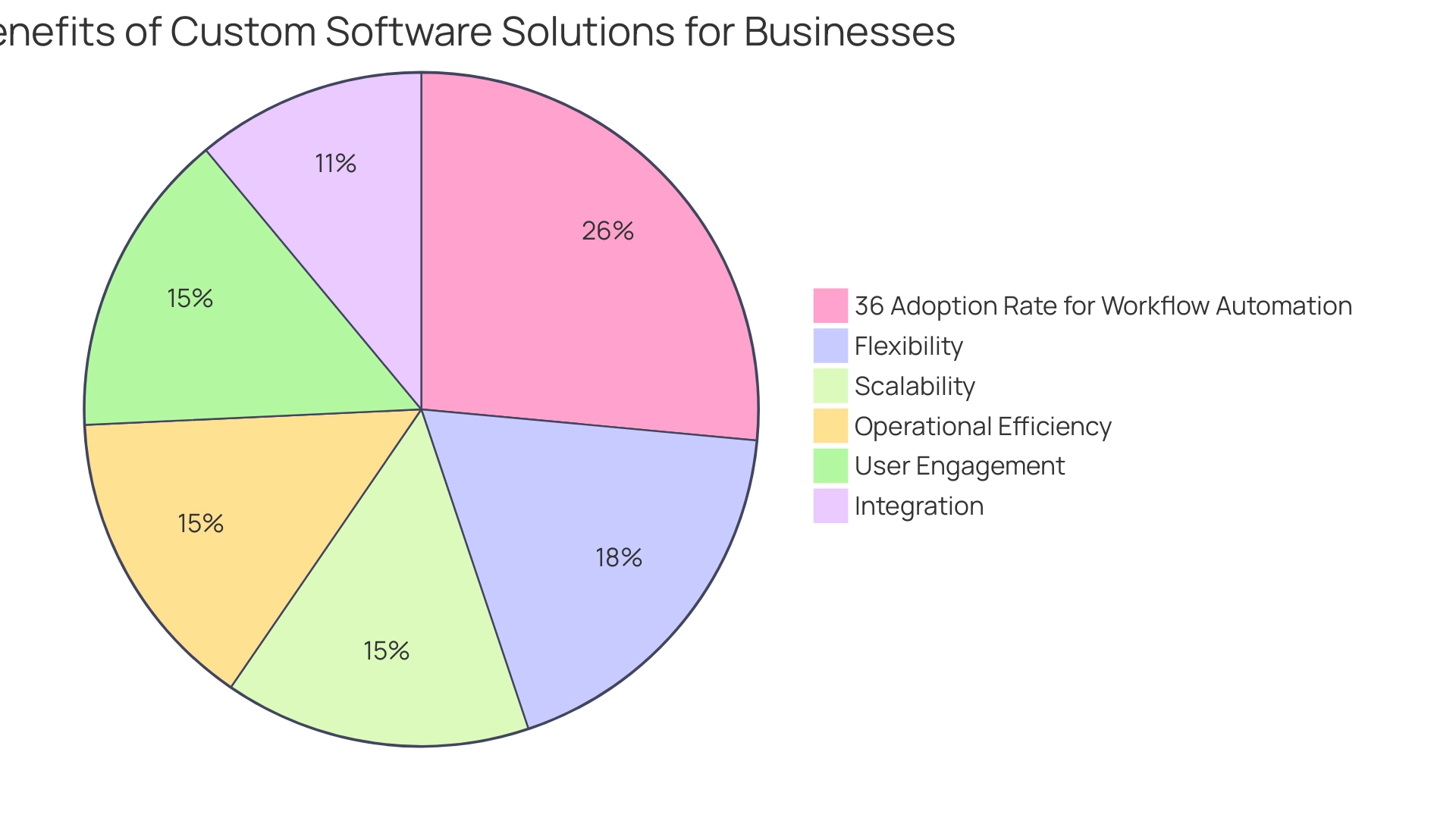
The Custom Software Development Process: From Idea to Implementation
The process of developing custom business software solutions encompasses several critical stages, including requirements gathering, design, development, testing, and deployment. Initially, stakeholders engage in collaborative discussions to pinpoint the specific needs and objectives of the system. This phase is crucial as it lays the groundwork for the entire project.
Following this, the design stage concentrates on creating a robust system architecture and an intuitive user interface, which are essential for a successful development process. Once the development phase is completed, rigorous testing is conducted to ensure that the application operates as intended and adheres to quality standards. This step is essential for identifying any potential issues before the application goes live.
After thorough testing, the application is deployed, and ongoing maintenance and support are established to resolve any issues that may arise post-launch. This organized and systematic approach not only reduces risks but also ensures that the final product is in alignment with overarching organizational objectives. As the enterprise technology market is projected to reach a staggering $344.4 billion by 2027, it is essential for businesses to adopt these best practices to remain competitive.
Moreover, effective communication and collaboration within development teams—an area highlighted by 60% of employers—are acknowledged as crucial to achieving successful results in custom business software solutions. Notably, 75% of the youth understand that mastering development skills is crucial for the future of technology, highlighting the importance of nurturing this knowledge within organizations. Additionally, outsourcing development is becoming increasingly essential for cost efficiency, faster product launches, and access to specialized skills, reflecting current industry trends.
Furthermore, cloud-based Business Process Automation tools are projected to attain $41.8 billion by 2023, expanding at a CAGR of 11.8%, highlighting the importance of embracing advanced technological options in today's market.
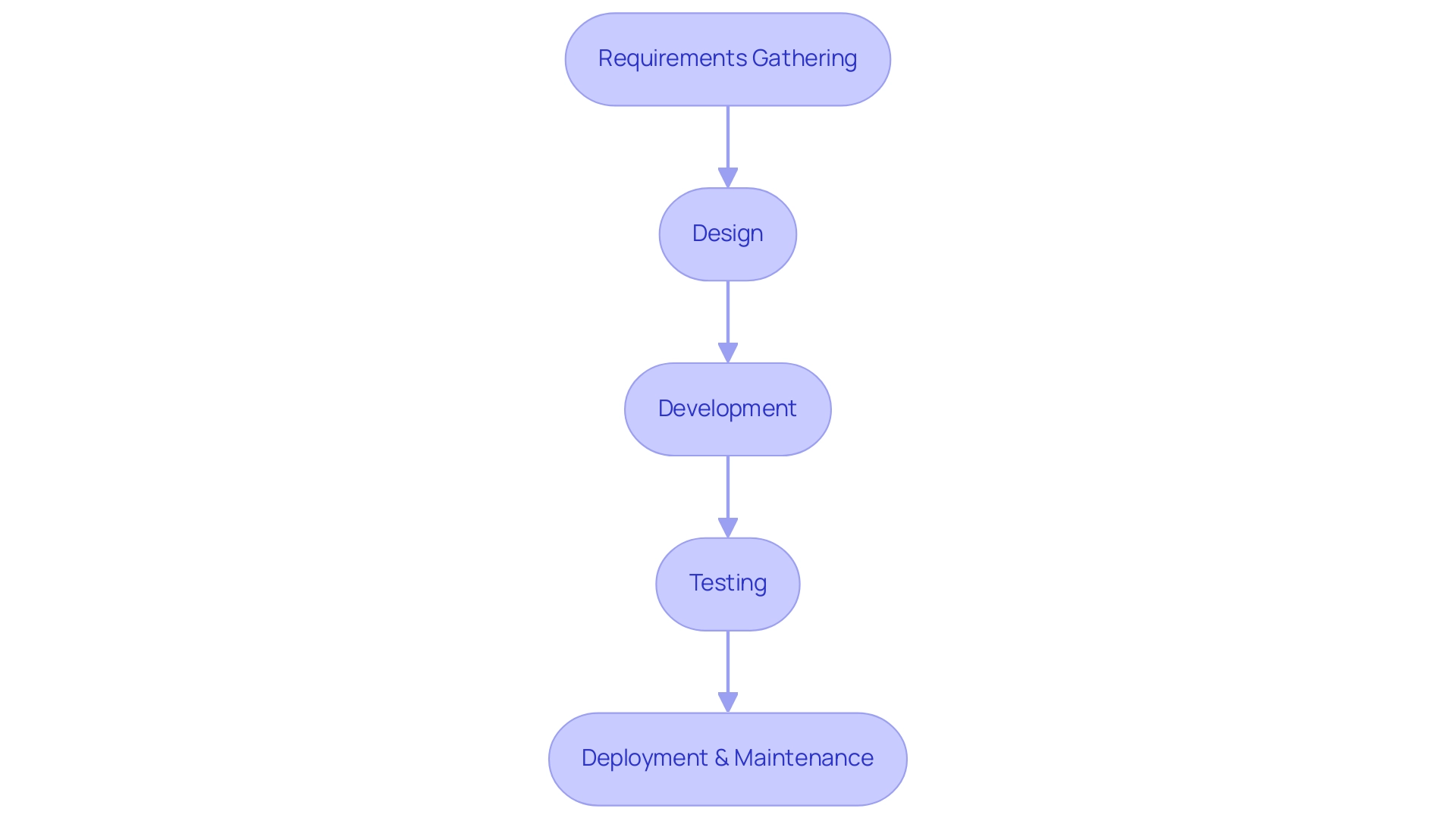
Custom Software vs. Off-the-Shelf Solutions: Making the Right Choice
When assessing the option between tailored applications and ready-made alternatives, companies must consider several crucial elements. Oleg Khanachivskyi observed that the internet's progression, marked by the emergence of Web 2.0, highlights the significance of flexibility in digital applications. While off-the-shelf options often present a lower initial cost and a faster implementation timeline—appealing to startups and small enterprises—they frequently lack the flexibility and specificity that custom software can offer.
Our customized e-commerce offerings, supported by over 20 years of unmatched experience, have a proven track record of significantly enhancing critical KPIs such as retention rates, Average Order Value (AOV), and Lifetime Value (LTV). These approaches also promote community value by aligning product offerings with the unique needs and preferences of your customer base, ultimately enhancing engagement and loyalty. The rise of e-commerce necessitates flexibility and throughput in direct-to-consumer supply chains, which custom systems can provide.
For example, recent discoveries indicate that kiosk applications can increase sales by up to 47%, highlighting the significant benefits of customized approaches. Conversely, the hidden costs associated with off-the-shelf software, such as recurring licensing fees and unnecessary features, can accumulate over time, leading to inflated overall expenses. A case study titled 'Hidden Costs of Off-the-Shelf Software Solutions' reveals that while these solutions may seem cost-effective initially, they often incur additional costs that can significantly impact long-term budgets.
For example, companies may find themselves paying for features they do not use or facing increased costs as their needs evolve. Therefore, businesses need to carefully consider their unique requirements, budget constraints, and future growth plans. A thorough cost-benefit assessment can clarify the long-term worth of custom business software solutions, making it a more strategic investment in a swiftly changing e-commerce environment.
Furthermore, personalized approaches can generate incremental revenue by optimizing processes and creating tailored customer experiences that lead to higher conversion rates.
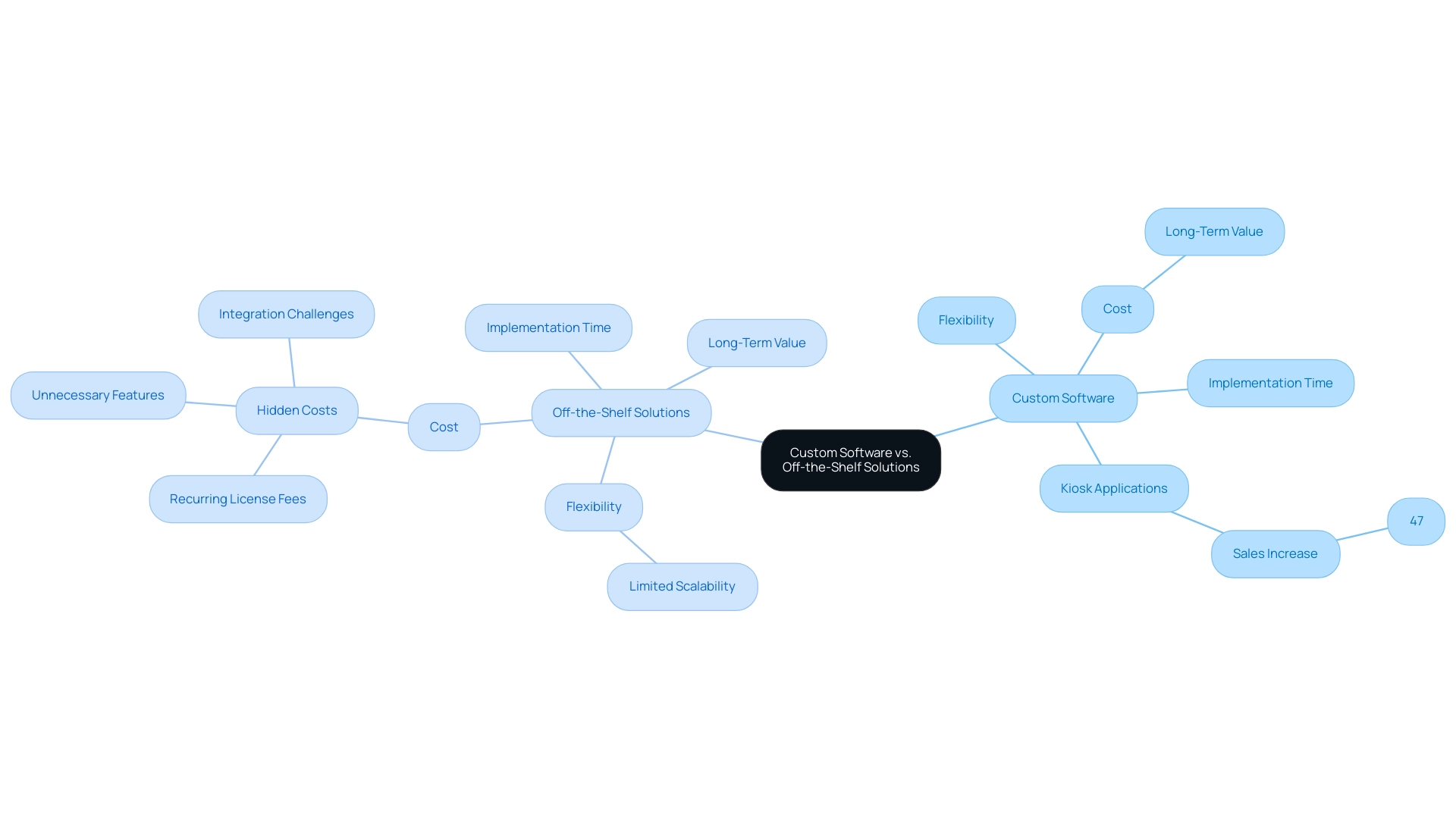
Industries That Thrive with Custom Software Solutions
Custom business software solutions have proven instrumental in enhancing operations across diverse industries, with tailored e-commerce tools specifically designed to address unique challenges and regulatory requirements. Our solutions have a proven track record of significantly improving critical KPIs, such as retention rates, Average Order Value (AOV), and Lifetime Value (LTV). In the healthcare sector, organizations increasingly adopt tailored patient management systems that not only comply with stringent regulations but also significantly enhance patient care, enabling healthcare providers to make informed decisions swiftly.
Retail establishments are utilizing tailored e-commerce platforms created to integrate seamlessly with inventory management systems, optimizing sales processes and enhancing the customer experience. Manufacturing firms employ tailored applications for effective supply chain management, enabling real-time tracking and enhanced operational efficiency. These implementations demonstrate that custom business software solutions are not limited to one industry; instead, they adjust to fulfill the various objectives of enterprises throughout the range.
With over 20 years of unmatched experience, we have assisted organizations globally in creating systems that generate millions in value. Our commitment to building community value is evident in our partnerships with various organizations, where we have developed platforms that not only drive revenue but also foster community engagement and support. As the employment landscape for programmers and engineers is expected to expand by 25% in the upcoming decade, this trend highlights the rising need for tailored responses.
Furthermore, translating AI into meaningful customer value is crucial for enhancing user experience and efficiency, a principle that drives many organizations to adopt custom business software solutions. As Knud Lasse Lueth, Founder of IoT Analytics, emphasizes, 'Throughout my journey, I have authored or co-authored over 100 reports, always with a commitment to delivering analyses that are not only trustworthy but also rich in insight and uniqueness.' This flexibility and dedication to personalized approaches are fueling the growth of the market for custom business software solutions, which is anticipated to expand considerably as sectors increasingly acknowledge the worth of these innovations.
Additionally, our clients have shared their positive experiences: 'The custom solutions provided have not only improved our efficiency but have also strengthened our community ties,' said Francois Duprat, Head of Product at Rakuten France.
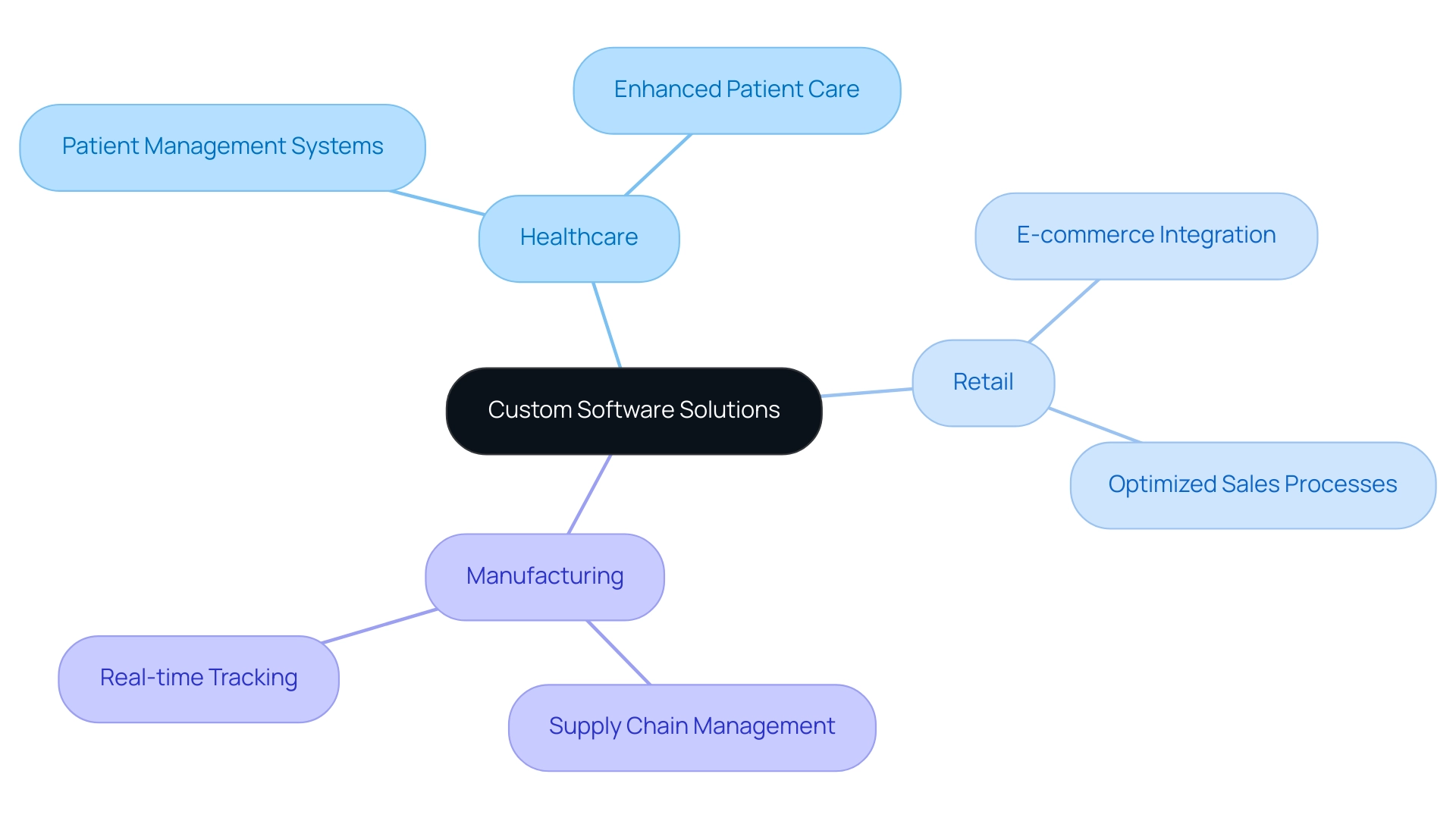
Conclusion
The analysis of custom software solutions underscores their essential role in modern business strategy. Unlike off-the-shelf software, custom applications are tailored to meet specific organizational needs, significantly enhancing operational efficiency and competitive advantage.
The benefits of custom software are substantial, offering flexibility, scalability, and seamless integration with existing systems. These solutions lead to improved key performance indicators, such as retention rates and Average Order Value. A thorough development process ensures alignment with business objectives, reducing risks and enhancing user satisfaction.
While off-the-shelf solutions may seem cost-effective at first glance, they often incur hidden costs and limitations that can stifle growth. Investing in custom software proves to be a more strategic choice, addressing unique operational demands and fostering innovation.
As industries increasingly recognize the value of custom solutions, the potential for improved community engagement and operational efficiency becomes evident. From healthcare to retail, tailored applications are driving enhancements in service delivery and customer satisfaction.
In conclusion, the movement towards custom software is not just a trend; it is a strategic necessity for companies aiming to excel in a dynamic marketplace. By adopting bespoke solutions, organizations can unlock their full potential and effectively tackle future challenges.





